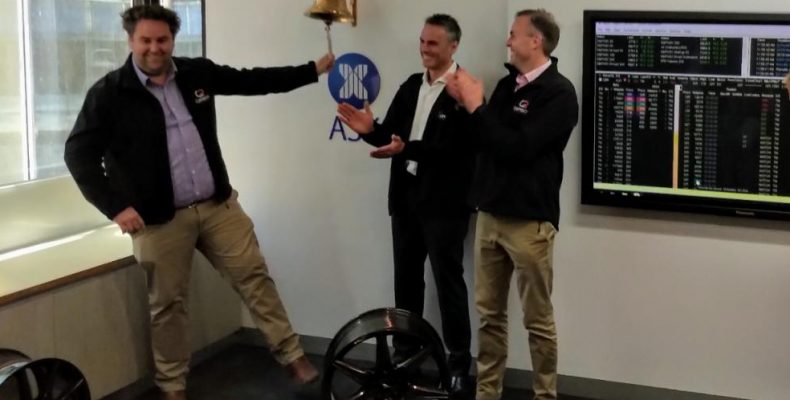It is already the world’s leading manufacturer of one-piece carbon fibre composite wheels, and now a new core of major investors are heartily backing Geelong-based Carbon Revolution’s ambitious vision of a segment-dominating future.
Boasting production supply deals with Ferrari, Ford, Renault and two other yet to be named manufacturers, and helping to set five new lap records, including two at the Nürburgring and one at Hockenheim this year, Chief Executive Jake Dingle says this is just the start in a massive market where 430 million wheels are produced every year for new vehicles.
Carbon Revolution, a founding member of the Advanced Fibre Cluster, debuted on the Australian Stock Exchange on November 29. The stock listed at $2.60 a share and immediately rose 36 percent to $3.55, giving a market capitalisation of almost $450 million.
Speaking to the Cluster team this week, Mr Dingle said the stellar rise of Cochlear and CSR since listing 25 years ago – two great Australian physical technology companies that dominate their segments globally – is inspiring.
“They are much more the sort of benchmarks for us than other local automotive companies that have been involved in servicing local markets or have been local divisions of large multinational companies,” he says.
Luke Preston, who led the Model 3 and the Model X in the automated Body-in-White launches at Tesla, is now heading up Carbon Revolution’s industrialisation team.
“We are bringing really good Australian people back to Australia and developing opportunities for them to work in this industry but in a very different form. It is all high-tech advanced manufacturing and it is all to a global, rather than a local, market,” Mr Dingle says.
It’s all a long way from the “four people in a shed” who founded Carbon Revolution over a decade ago.
After clinching its first major contract with Ford in the US in 2014, supply deals with Ferrari and Renault have followed, backed up by a recent strategic supply agreement, a contract with a global SUV manufacturer, a memorandum of understanding with Mitsui and Co and developing wheels for the Chinook helicopter as part of a Federal Government funded program through the Defence Innovation Hub.
Major Australian financial institutions backed the Carbon Revolution IPO, with CBA now a substantial shareholder and Quest Asset Management holding almost 7%. Some investment from North America and Hong Kong was attracted as well.
A greenfield 3000 m² factory purpose-built to commercialise the product was expanded to 10,000 m² early this year “so that we can scale right up,” Mr Dingle explains. The company now employs more than 430 and has rapidly grown its annualised production rate, which by June 2020 will be at 32,000 wheels a year.
“It has been a lot of hard work.,” says Mr Dingle. “There haven’t been any major ‘Aha’ moments, there is no silver bullet to this. It is a whole series of different technology breakthroughs that we have had to coordinate together.”
For the medium-term, the factory in Geelong will still serve the luxury and premium markets but management sees carbon wheels as ultimately being a disruptive technology on a large scale.
Like disc brakes, vehicle air conditioning and fuel injection, Carbon Revolution’s wheels were first embraced at the premium end of the market but are expected to trickle down and “gradually become more mainstream,” though the firm will keep developing the most cutting-edge variants of the technology in parallel.
“We are barely scratching the surface,” says Mr Dingle. “The business is on a steep trajectory and ultimately the aim always from the outset over a decade ago was to develop this as a disruptive technology. Not a niche, just-high-performance technology. The long-term aspiration for the technology is that it displaces metal wheels on a large scale as we grow capacity and reduce our costs.”
Made to match the specifications of a metal wheel at nearly half the weight, the focus is now intently on automation and some raw material initiatives to substantially lower costs, which, in the case of direct costs, are already down more than a third in just a year.
Mr Dingle says a “very practical” approach to development and “a very, very smart and passionate bunch of people” are behind the company’s considerable achievements where others around the globe have tried and failed.
Carbon Revolution has been manufacturing since 2014 and Mr Dingle says the company is “considered within the industry to be at least five years ahead of anyone else just based on the fact that no one else has got to the stage of even having a factory.” This has allowed management to secure programs with OEMs, where investment has been committed to making sure Carbon Revolution technology is suitable for their vehicles.
“There only really appears to be prototypes out in the market of anything similar,” Mr Dingle says. “It’s arguably the world’s most sophisticated carbon fibre composite structure and we are mass-producing it on our purpose-built equipment now. So we have taken several leaps forward in relative terms.”
One of the hallmarks of the business is that management has stuck with its vision and not been distracted by the temptation to use the intellectual property and techniques for other things too hastily. For example, they have resisted calls from the aerospace industry for many years. Mr Dingle says it is only now that the team “believes we have earned the right to go and exploit the technology” in adjacent sectors beyond automotive.
“The excitement of this next phase is just beginning. We have a huge amount of opportunity ahead of us and that is what we are very focused on,” he says.
Dec 2019
